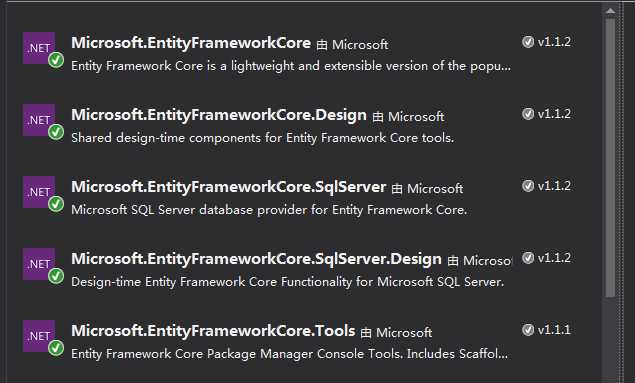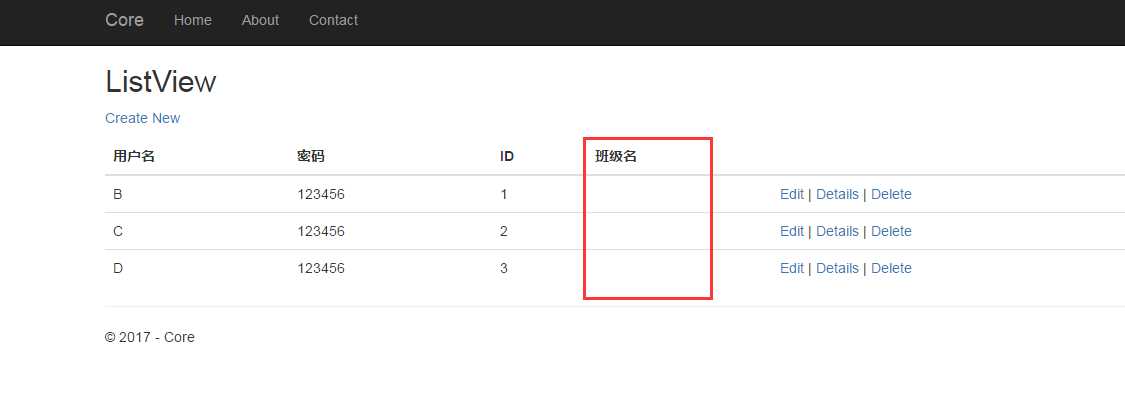标签:uri context route ble sqlserver 技术分享 body edit 分享
很久没写博客了,因为真的很忙,终于空下来,打算学习一下EF Core顺便写个系列, 今天我们就来看看第一篇DBFirst.
本文环境:VS2017 Win7 .NET Core1.1 EF Core1.1.2
这里我们不讨论是用DBFirst好,还是CodeFirst高端..各有各自的用处和适用场景..
我们单纯的只是来使用这个DBFirst..
既然是DBFirst,那么在用DBFirst之前..首先你要有一个数据库(嗯,废话)
其次,如果你是Windows7系统 那么需要升级你的Windows PowerShell到3.0+的版本
然后你需要安装相关的工具包,从NuGet下载即可如下图:

为了方便你们复制..我列一下:
Microsoft.EntityFrameworkCore
Microsoft.EntityFrameworkCore.SqlServer
Microsoft.EntityFrameworkCore.Tools
Microsoft.EntityFrameworkCore.Design
Microsoft.EntityFrameworkCore.SqlServer.Design
然后,我们在VS的工具选项中,选择NuGet包管理器,选择程序包管理控制台
输入命令行:
Scaffold-DbContext "这里输入你的数据库连接字符串" Microsoft.EntityFrameworkCore.SqlServer
就会生成一个Modles文件夹如图:
这里面就是你的上下文对象和相关的实体类了.
我们进到上下文对象,会发现自己的连接字符串是固化在这里面的,如图:

我们当然不能这么做,所以,请删除掉他.
下一步,我们使用Asp.net Core 来测试测试看能不能访问.
创建Core项目的流程,我就不说了
然后给你的Core项目用NuGet添加引用:Microsoft.EntityFrameworkCore.SqlServer和Microsoft.EntityFrameworkCore
在配置文件里添加数据库连接字符串:
"ConnectionStrings": { "SchoolConnection": "Data Source=.;Initial Catalog=School_Test;User ID=**;Password=***;MultipleActiveResultSets=true" }
然后我们在Startup中注入我们的上下文对象:
在ConfigureServices()方法中注入,代码如下:
public void ConfigureServices(IServiceCollection services) { // Add framework services. //注入SignalR.(与本文无关,请无视) services.AddSignalR(options => { options.Hubs.EnableDetailedErrors = true; }); //注入上下文对象 services.AddDbContext<School_TestContext>(options => options.UseSqlServer(Configuration.GetConnectionString("SchoolConnection"))); services.AddMvc(); }
我们创建控制器,代码如下:
public class TestController : Controller { //构造函数注入上下文 private readonly School_TestContext _context; public TestController(School_TestContext Context) { _context = Context; } public IActionResult ListView() { return View(_context.UserTable.ToList()); } }
创建相应的视图如下:
@model IEnumerable<EFCoreModel.Modles.UserTable> @{ ViewData["Title"] = "ListView"; Layout = "~/Views/Shared/_Layout.cshtml"; } <h2>ListView</h2> <p> <a asp-action="Create">Create New</a> </p> <table class="table"> <thead> <tr> <th> 用户名 </th> <th> 密码 </th> <th> ID </th> <th> 班级名 </th> <th></th> </tr> </thead> <tbody> @foreach (var item in Model) { <tr> <td> @Html.DisplayFor(modelItem => item.UserName) </td> <td> @Html.DisplayFor(modelItem => item.PassWord) </td> <td> @Html.DisplayFor(modelItem => item.Id) </td> <td> @Html.DisplayFor(modelItem => item.Class.ClassName) </td> <td> <a asp-action="Edit" asp-route-id="@item.Id">Edit</a> | <a asp-action="Details" asp-route-id="@item.Id">Details</a> | <a asp-action="Delete" asp-route-id="@item.Id">Delete</a> </td> </tr> } </tbody> </table>
运行代码,会报错.如下错误:
No database provider has been configured for this DbContext. A provider can be configured by overriding the DbContext.OnConfiguring method or by using AddDbContext on the application service provider. If AddDbContext is used, then also ensure that your DbContext type accepts a DbContextOptions<TContext> object in its constructor and passes it to the base constructor for DbContext.
这是因为我们通过DBFirst生成的上下文并不能直接拿来注入使用.我们需要改造一下,给上下文添加构造函数,如下:
public School_TestContext(DbContextOptions options) :base(options) { }
然后在运行我们的代码.得到结果如下:

我们发现红框位置的作为关联表的班级名,并没有显示~,这个留待我们后面讲解.
标签:uri context route ble sqlserver 技术分享 body edit 分享
原文地址:http://www.cnblogs.com/GuZhenYin/p/6857413.html